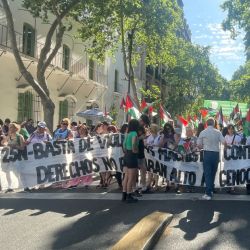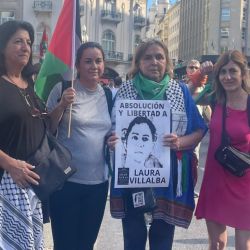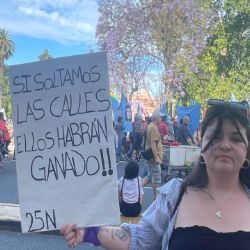Parades of porteños marched through downtown Buenos Aires on Saturday (November 25) to mark International Day for the Elimination of Violence Against Women.
From the National Congress building to the Casa Rosada, the seat of government, demonstrators in Buenos Aires rallied for various causes but were united in their call for an end to violence against women and girls.
Banners highlighting diverse causes – from the orange flag representing an end to violence against women, the rainbow flag for LGBT rights, the Wiphala indigenous logo, and others for participating organisations – fluttered and flew above marchers.
Palestinian flags were notably prominent given the outbreak of war in the Middle East. Green, white, red, and black could be seen sprinkled throughout the entire march. Many wrapped the chequered black-and-white Palestinian keffiyeh scarf around their necks.
Afife Khoury, 38, said she had come to the protest to support Palestine. “It is my duty and it runs in my blood,” she said.
A Salvadoran-Palestinian independent consultant who currently lives in Buenos Aires, Khoury said she was delighted to see so much support for the cause, “especially in these moments of so much injustice and so much pain for the community.”
“I don’t have family in Gaza. I have family in the West Bank, which is part of the occupied territories so they suffer all the atrocities that the apartheid state of Israel perpetuates,” she explained.
Concerns, however, were domestic as much as international. Given this month’s election of right-wing libertarian Javier Milei as Argentina’s net president, fears ran high about what is to come under the next government.
Teacher Segundo Gelos, 33, said that fighting with the Workers’ Socialist Movement (MST) has taught him about the importance of not letting women dissent by themselves.
“If we listen and see how we can contribute to the fight, be in the streets with all those people who need it. We cannot just simply let women fight for their rights, now the Palestinians fight for theirs.” said Gelos, who teaches literature, theatre and primary school English.
“We are all workers and we all have to defend ourselves and fight for what we want and for the rights we need. And everything that we win, we win it in the street so make your voices heard,” said the educator.
Many young demonstrators, who were not necessarily associated with organised groups, expressed similar concerns about the future.
“From the people I know who voted for Javier Milei, they voted because they didn’t have enough money in their wallets,” said 21-year-old student Mali Solis, who joined the march independently.
Solis, who is training to be a social worker, said she completely understood, given rising poverty and inequality in Argentina, where inflation is running at more than 140 percent per annum.
“It’s heartbreaking because the people voted [for Milei] because of hunger and they let go of fundamental rights,” she said, her eyes welling up with tears.
Solis said the results of the election would directly impact upon her future and her rights as a public university student, citing Milei’s vocal calls for the privatisation of education. She also fears a rollback of Argentina’s historic abortion reform bill, given that the president-elect has publicly stated his opposition to it.
The youngster is equally concerned about human rights and feels Milei and his party’s criticism of historic humanitarian organisations is unfair. She feels the country is going backwards.
“I went to see the Abuelas [de Plaza de Mayo] on Thursday. I had never seen so many people,” said Mali, referring to the Grandmothers of the Plaza de Mayo, the human rights organisation that searches for children whose identities were stolen during the 1976-1983 military dictatorship.
“The Abuelas are older people who have been fighting for their rights for 40 years. They don’t deserve this,” she concluded.




















Comments